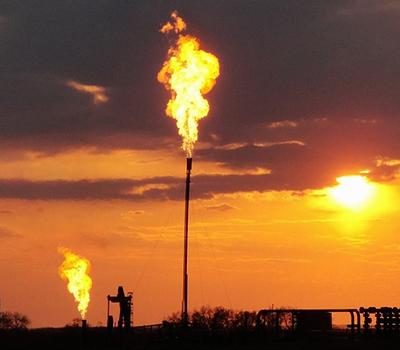
NEW YORK, New York, December 6, 2020 (ENS) – Major players in the oil and gas industry such as Shell, BP and Total have agreed to report emissions of the potent greenhouse gas methane with a new, much higher level of transparency. The goal is to enable the oil and gas industry to realize deep reductions in methane emissions over the next decade in a way that is transparent to civil society and governments.
To support the realization of global climate targets, the Oil and Gas Methane Partnership aims to deliver a 45 percent reduction in the industry’s methane emissions by 2025, and a 60-75 percent reduction by 2030.

Methane released directly into the atmosphere has more than 80 times the warming power of the greenhouse gas carbon dioxide, CO2, over a 20-year period. Actions to cut methane emissions can yield a near-term reduction in the rate of warming, complementing efforts to decarbonize the world’s energy and transport systems while also delivering air quality benefits.
On November 23, the Oil and Gas Methane Partnership, OGMP, announced its new framework simultaneously in Nairobi, Brussels and New York. The OGMP 2.0 framework is the new standard that is intended to improve the reporting accuracy and transparency of methane emissions in the oil and gas sector.
“To win the race to net-zero emissions, we need everyone on board. We need ambitious action from the oil and gas industry,” Inger Andersen, executive director, UN Environment Programme said. “UNEP is committed to supporting efforts that reduce methane emissions, and we recognize the leadership of companies that have joined such an ambitious methane reporting framework. We look forward to seeing actions that turn commitments into actual emissions reduction.”
The Oil and Gas Methane Partnership, launched at the UN Climate Summit in 2014, is a Climate and Clean Air Coalition initiative led by the UN Environment Programme, the European Commission, and the U.S.-based Environmental Defense Fund.
OGMP is the only multi-stakeholder partnership working on methane emissions reporting. It provides a protocol to help companies systematically manage their methane emissions from oil and gas operations and offers a credible platform to help member companies demonstrate actual reductions to industry stakeholders.
To date, 62 companies with assets on five continents, representing 30 percent of the world’s oil and gas production, have joined the partnership.
At the core of the effort is the OGMP 2.0 framework, a comprehensive measurement-based methane reporting framework that will make it easier for officials, investors and the public to accurately track and compare performance across companies in ways that have not been possible to this point.
For its part the European Commission is planning to propose legislation making measurement, reporting, and verification for all energy-related methane emissions compulsory, building on the OGMP 2.0 framework.
“I am very happy to see the energy industry taking immediate action on methane emissions. A clear commitment to measure and monitor emissions is an important first step for significantly reducing them and I am proud of what we have achieved together,” said EU Energy Commissioner Kadri Simson. “Today’s signature is the first deliverable under the Commission’s recent methane strategy. There are many more steps to take to cut emissions along the entire value chain and I hope to work closely with all – European and international – partners to reach this goal.”
The OGMP 2.0 framework applies to the full oil and gas value chain, not only upstream production but also midstream transportation and downstream processing and refining – areas with substantial emissions potential that are often left out of reporting today.
The OGMP 2.0 framework includes a company’s own operations and also joint ventures responsible for a substantial share of their production.
Technology is Not a Barrier
The International Energy Agency advises that roughly three-quarters of all methane emissions could be reduced with the technology that exists today, and close to half at zero net cost. Reducing methane emissions from the energy sector by 90 percent would shave two-tenths of a degree Celsius from the forecasted rise in the planet’s average temperature by 2050.
Reducing fossil methane emissions by 75 percent can prevent up to six gigatonnes of carbon dioxide equivalent emissions annually – almost 10 percent of the planet’s 2019 greenhouse gas emissions, including land-use change.
“Thanks to the 62 companies for committing to measure, report and reduce pollution from their core operations and joint ventures. This will be the basis for robust standards in Europe, and beyond, that ensure the oil industry takes the practical actions urgently needed for our climate,” said Fred Krupp, president of the New York-based nonprofit Environmental Defense Fund.
A 2019 study by scientists from the National Oceanic and Atmospheric Administration, the LLBerkeley Lab, and the University of Colorado Boulder found that in the past decade, natural gas production in the United States has increased by at least 46 percent. Yet, based on long‐term and well‐calibrated measurements, we find that
- – There is no large increase of total methane emissions in the United States in the past decade
- – There is a modest increase in oil and gas methane emissions, but this increase is much lower than some previous studies suggest
- – The assumption of a time‐constant relationship between methane and ethane emissions has resulted in major overestimation of an oil and gas emissions trend in some previous studies
New Observatory Will Track Methane Emissions
The UN Environment Programme, UNEP, and the European Commission are finalizing plans to set up an independent International Methane Emissions Observatory. It will aggregate and analyze multiple methane emissions data streams, including data reported by OGMP member companies, to accelerate reductions in methane emissions globally.
By assisting industry and governments globally in addressing uncertainty related to reported emissions, the Observatory will improve the consistency and credibility of methane emissions data and accelerate mitigation actions.
Total, the French energy company that produces and markets fuels, natural gas and electricity, has been a part of the Oil and Gas Methane Partnership since 2014. Now, Total has joined the second phase, OGMP 2.0. This second phase of the partnership aims at defining a broader and more ambitious methane-reporting framework, extended to the entire gas value chain.
“Reducing methane emissions is a key element to ensure that natural gas fully plays its role in the energy transition and this new partnership will foster the sharing of industry best practices, especially on non-operated assets, and improve monitoring,” said Total Chairman and CEO Patrick Pouyanné. “It is a new step in the fight against methane emissions and our industry is deeply committed to the success of this initiative.”
Claudio Descalzi is the chief executive officer of ENI, a large Italian energy company dealing in petroleum, natural gas, and petrochemicals. He agrees with Total’s Pouyanné, saying, “Reducing methane emissions is a crucial effort in the industry’s decarbonization pathway.”
“As a factor on which we can have an immediate and concrete positive impact, OGMP 2.0 offers an internationally recognized blueprint to companies across our industry willing to make improvements in their emission reductions in all phases of the value chain,” Descalzi said. “We look forward to continue working with all partners involved, as only through collaboration with international organizations, civil society and governments we can deliver on our common goals.”
Copyright Environment News Service (ENS) 2020. All rights reserved.



